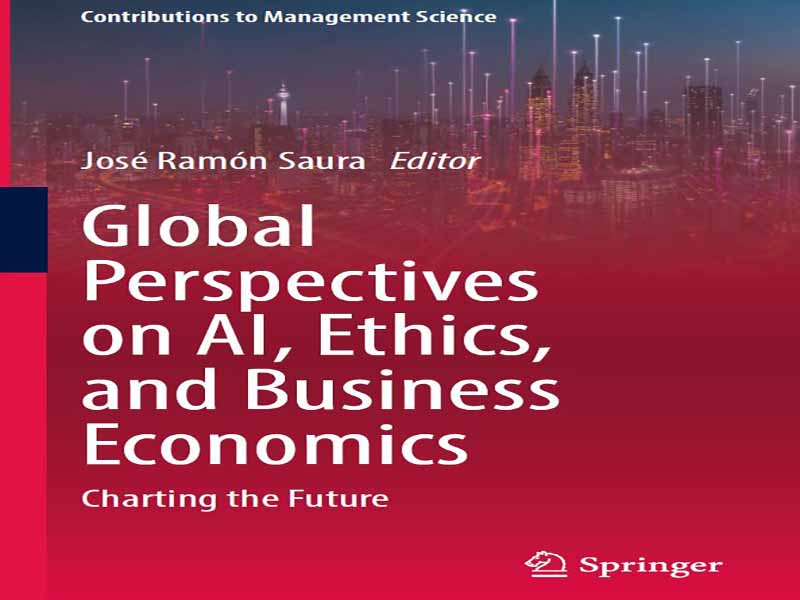- عنوان کتاب: Global Perspectives on AI, Ethics, and Business Economics Charting the Future
- نویسنده: José Ramón Saura
- حوزه: اخلاق در هوش مصنوعی
- سال انتشار: 2025
- تعداد صفحه: 281
- زبان اصلی: انگلیسی
- نوع فایل: pdf
- حجم فایل: 3.71 مگابایت
امروزه موضوعات کمی به اندازه هوش مصنوعی (AI) بحث و پتانسیل تحولآفرینی ایجاد میکنند. هوش مصنوعی که زمانی محدود به آزمایشگاههای تحقیقاتی بسیار تخصصی بود، به سرعت وارد جریان اصلی شده و نحوه عملکرد کسبوکارها، نحوه تعامل افراد با فناوری و نحوه تصور ملتها از آینده اقتصادی و اجتماعی خود را تغییر داده است. با این حال، سرعت سرسامآور تکامل هوش مصنوعی، نیاز فوری به تأمل، گفتگو و ایجاد اجماع پیرامون تأثیرات اخلاقی و اقتصادی ناشی از تبدیل شدن الگوریتمها به بخشی از زندگی روزمره را ایجاد میکند.
این کتاب، «چشماندازهای جهانی در مورد هوش مصنوعی، اخلاق و اقتصاد کسبوکار: ترسیم آینده»، به بررسی تأثیر عمیق هوش مصنوعی بر چشماندازهای کسبوکار، ساختارهای حاکمیتی و چارچوبهای اجتماعی میپردازد. در حالی که نوآوریهای فنی در هوش مصنوعی توجه علمی و رسانهای زیادی را به خود جلب کرده است، سؤالات مربوط به مرزهای اخلاقی، مدلهای کسبوکار و پیادهسازی آن در دنیای واقعی به شیوهای جامع نسبتاً کمتر مورد مطالعه قرار گرفتهاند. این کتاب با بهرهگیری از مشارکت متخصصان در مناطق و بخشهای مختلف، قصد دارد این شکاف را پر کند و دیدگاهی پانوراما از چگونگی تأثیر هوش مصنوعی بر اقتصادها و جوامع در سراسر جهان ارائه دهد. یکی از انگیزههای پشت این پروژه، درک این موضوع است که هوش مصنوعی فقط یک ابزار تکنولوژیکی دیگر نیست، بلکه یک اکوسیستم پیچیده از دادهها، الگوریتمها و تعاملات انسانی است که به طور مداوم در پاسخ به نیروهای اجتماعی، اقتصادی و نظارتی در حال تغییر، تکامل مییابد. در واقع، توانایی هوش مصنوعی در یادگیری از مجموعه دادههای عظیم و سازگاری با زمینههای در حال تغییر، میتواند هم منبع بینشهای قابل توجه و هم یک عامل منفی باشد، زمانی که تعصبات، نقض حریم خصوصی یا فرآیندهای تصمیمگیری مبهم در آن گنجانده شده باشد. این تنشهای اخلاقی در محیطهای تجاری، جایی که استقرار هوش مصنوعی ممکن است منجر به افزایش بهرهوری، تجربیات سفارشی مصرفکننده و صرفهجویی در هزینه شود، به چشم میآیند. با این حال، نگرانیهایی را در مورد نظارت، انحصارهای دیجیتال و گسترش نابرابریها در دسترسی به دادهها یا تخصص سطح بالا نیز ایجاد میکند. از بسیاری جهات، ظهور هوش مصنوعی و پذیرش سریع آن توسط شرکتها در سراسر جهان، آنچه را که ما از «اقتصاد تجاری» منظور میکنیم، از نو تعریف میکند. ملاحظات سنتی، مانند عرضه و تقاضا، رقابت در بازار، تخصیص منابع و حداکثرسازی سود، هنگامی که با یادگیری ماشینی، تجزیه و تحلیل پیشبینیکننده و تصمیمگیری خودکار تقویت میشوند، ابعاد جدیدی به خود میگیرند. شرکتها اکنون میتوانند الگوریتمهایی را به کار گیرند که رفتار مصرفکننده را با دقت چشمگیری پیشبینی میکنند و استراتژیهایی را هدایت میکنند که شامل تبلیغات بیش از حد شخصیسازیشده، قیمتگذاری پویا و مدیریت پیشرفته زنجیره تأمین است. بنابراین، چنین بهبودهایی در بهرهوری ممکن است به طور واضح مثبت به نظر برسند. با این حال، بررسی عمیقتر، نیاز به دستورالعملهای اخلاقی قوی در رابطه با میزان شفافیت این مدلهای پیشبینی برای عموم را آشکار میکند. وقتی بهترین «تصمیم» بعدی توسط یک هوش مصنوعی از قبل محاسبه میشود، چه پیامدهایی برای استقلال مصرفکننده خواهد داشت؟ آیا ممکن است مزایای اقتصاد دیجیتال به طور ناهموار افزایش یابد و به نفع نهادهای بزرگی باشد که منابع محاسباتی برای جمعآوری و تجزیه و تحلیل حجم عظیمی از دادهها را دارند؟
پاسخ به این نوع سؤالات نیازمند یک دیدگاه میانرشتهای است که علوم کامپیوتر، حقوق، اقتصاد، فلسفه و مدیریت سازمانی را در کنار سایر زمینهها در بر میگیرد. محققان و متخصصانی که در هوش مصنوعی تخصص دارند، اغلب دیدگاههای رشتهای خود را به کار میگیرند و بر جنبههای محدودتری مانند دقت مدل، کارایی محاسباتی یا سوگیری الگوریتمی تمرکز میکنند. در حالی که این بحثهای تخصصی بسیار مهم هستند، اما همیشه پیامدهای استراتژیک و اجتماعی گستردهتر پذیرش هوش مصنوعی را در بر نمیگیرند. بنابراین، این کتاب ویرایششده، در پی ادغام این بحثهای تخصصی در یک چارچوب تحلیلی گستردهتر است که به صراحت به چگونگی شکلگیری رفاه انسانی، رقابتپذیری تجاری و ساختارهای اقتصادی جهانی توسط هوش مصنوعی میپردازد.
به همان اندازه، تنوع جغرافیایی پیادهسازی هوش مصنوعی نیز از اهمیت بالایی برخوردار است. مناطق و کشورهای مختلف، هوش مصنوعی را به روشهایی پذیرفتهاند که منعکسکننده منابع محلی، اولویتهای سیاستگذاری، هنجارهای فرهنگی و شرایط بازار است. به عنوان مثال، کشورهایی با قوانین سختگیرانه حفاظت از دادهها ممکن است نوع تجزیه و تحلیلهای دادهمحوری را که کسبوکارها میتوانند به کار گیرند، محدود کنند، در حالی که برخی دیگر ممکن است موضع نظارتی آسانتری را برای تحریک نوآوری اتخاذ کنند. در برخی مناطق، هزینههای ساخت زیرساخت دیجیتال قابل اعتماد ممکن است میزان استقرار هوش مصنوعی را محدود کند و باعث ایجاد نابرابری در دسترسی و فرصت شود. در همین حال، رقابت جهانی برای جذب استعدادها و سرمایههای هوش مصنوعی میتواند شکاف بین مراکز فناوری و مناطقی که در آمادگی دیجیتال عقب ماندهاند را افزایش دهد. این عوامل سرعت انتشار هوش مصنوعی و چگونگی تجلی اصول اخلاقی در موارد استفاده در دنیای واقعی را شکل میدهند.
تحت این الگوی جدید، فصلهای این کتاب با دقت انتخاب شدهاند تا طیف وسیعی از موضوعات و بخشها را نشان دهند. خوانندگان با مباحثی در مورد اقتصاد دادهها، چارچوبهای حاکمیت اخلاقی، ظهور بازاریابی دیجیتال بیش از حد شخصیسازیشده و کاربرد هوش مصنوعی در … مواجه خواهند شد…
Few subjects today generate as much debate and transformative potential as Artificial Intelligence (AI). Once confined to highly specialized research labs, AI has rapidly entered the mainstream, reshaping how businesses operate, how individuals interact with technology, and how nations envision their economic and social futures. Yet, the breakneck speed at which AI evolves creates a correspondingly urgent need for reflection, dialogue, and consensus-building around the ethical and economic impacts that emerge when algorithms become part of everyday life.
This volume, Global Perspectives on AI, Ethics & Business Economics: Charting the Future, sets out to explore the profound influence of AI on the business landscapes, governance structures, and societal frameworks. While technical innovations in AI have garnered much scholarly and media attention, questions related to its ethical boundaries, business models, and real-world implementation have remained relatively understudied in a holistic manner. Drawing on contributions from experts across different regions and sectors, this book aims to fill that gap, offering a panoramic view of how AI reverberates through economies and communities worldwide.
One of the motivations behind this project is the realization that AI is not just another technological tool, but rather a complex ecosystem of data, algorithms, and human interactions that continuously evolves in response to shifting social, economic, and regulatory forces. Indeed, AI’s ability to learn from massive datasets and adapt to changing contexts can be both a source of remarkable insights and a liability when biases, privacy violations, or opaque decision-making processes are embedded within it. These ethical tensions come to the fore in business environments, where AI’s deployment may yield productivity gains, tailored consumer experiences, and cost savings. Yet, it also prompts concerns about surveillance, digital monopolies, and widening inequalities in access to data or high-level expertise.
In many respects, the emergence of AI and its swift adoption by corporations worldwide recast what we mean by “business economics.” Traditional considerations, such as supply and demand, market competition, resource allocation, and profit maximization, take on new dimensions when augmented by machine learning, predictive analytics, and automated decision-making. Companies can now harness algorithms that forecast consumer behavior with striking precision, driving strategies that include hyper-personalized advertisements, dynamic pricing, and advanced supply chain management. Thus, such efficiency enhancements may seem unequivocally positive. However, deeper inquiry reveals a need for robust ethical guidelines related to how transparent should these predictive models be to the public? What are the implications for consumer autonomy when the next best “decision” is pre-calculated by an AI? Might the digital economy’s benefits accrue unevenly, favoring large entities that have the computational resources to collect and analyze massive amounts of data?
Addressing these sorts of questions requires an interdisciplinary perspective that spans computer science, law, economics, philosophy, and organizational management, among other fields. Researchers and practitioners who specialize in AI often bring their own disciplinary lenses, focusing on narrower aspects such as model accuracy, computational efficiency, or algorithmic bias. While these specialized debates are crucial, they do not always capture the broader strategic and societal ramifications of AI adoption. This edited book, therefore, seeks to integrate these specialized discussions into a wider analytical framework that explicitly tackles how AI shapes human well-being, business competitiveness, and global economic structures.
Equally paramount is the geographic diversity of AI implementation. Different regions and countries have embraced AI in ways that reflect local resources, policy priorities, cultural norms, and market conditions. For instance, nations with stringent data protection laws may constrain the kind of data-intensive analytics that businesses can employ, whereas others might adopt a more permissive regulatory stance to spur innovation. In some localities, the costs of building reliable digital infrastructure may limit the extent to which AI can be deployed, creating disparities in access and opportunity. Meanwhile, global competition for AI talent and investment capital can widen gaps between technology hubs and regions that lag behind in digital readiness. These factors shape the speed of AI diffusion and how ethical principles manifest in real-world use cases.
Under this new paradigm, the chapters in this book have been carefully chosen to represent a range of topics and sectors. Readers will encounter discussions about data economies, ethical governance frameworks, the rise of digital marketing hyper-personalization, and the application of AI to public services, among other themes. Each chapter offers distinct insights into how machine intelligence interacts with business processes, policy considerations, and social values. While some authors tackle broad theoretical questions, others ground their analyses in detailed case studies that illuminate how AI-enabled innovations take shape in practice.
Despite the intellectual diversity in these chapters, a unifying message runs through them: AI, when harnessed judiciously, carries the potential to advance economic prosperity, spur innovation, and address complex societal challenges. From healthcare optimization to sustainable resource management. Yet, AI also presents risks when developed or applied in ways that undermine democratic norms, exacerbate inequalities, or disregard data privacy. Balancing these competing outcomes is at the heart of AI ethics, and by extension, at the heart of this edited volume. In writing and editing Global Perspectives on AI, Ethics & Business Economics: Charting the Future, I have been repeatedly struck by the notion that AI is as much about human choices and values as it is about computational capabilities. Also, while AI can automate certain decisions, individuals and institutions remain accountable for setting the boundaries within which those decisions occur. Consequently, the very term known as AI might be a misnomer if it obscures the human agency behind AI’s lifecycle, from design and training to deployment and oversight.
In this context, another feature that emerged strongly during the development of this edited book is the tension between localized ethical standards and the global ambitions of AI-driven businesses. Multinational corporations face the challenge of reconciling different legal frameworks, cultural expectations, and risk tolerances as they roll out AI solutions worldwide. Local stakeholders, for their part, may need to adapt AI tools to fit unique infrastructure or workforce requirements, while simultaneously adopting best practices from leading technology firms. The connection of these local and global dynamics shapes an evolving conversation that will continue as AI’s capabilities and societal roles expand in unforeseen ways.
Above all, this edited book aims to spark deeper reflection and collaboration. Whether you are an executive evaluating how to responsibly integrate AI into your firm’s strategy, a policymaker grappling with the complexities of AI oversight, an academic exploring theoretical paradigms, or a student eager to understand the future of AI-driven economies, this edited volume provides an invitation to think critically and creatively about AI’s transformative power. The “global perspectives” words in the title are not just a nod to the multinational or multicultural nature of contemporary business, they represent a call to inclusivity, urging stakeholders worldwide to recognize their shared responsibility in guiding AI’s trajectory toward ethical and equitable outcomes.
A key impetus behind this edited volume is the recognition that meaningful discourse on AI must not be confined to abstract theorizing or purely technical descriptions; it must also address how the technology intersects with pressing realities of business practice and societal well-being. As AI’s capacity for real-time analytics and predictive modeling grows more sophisticated, private and public decision-making becomes increasingly data-driven. From forecasting supply chain disruptions and detecting fraud to influencing consumer preferences and managing public infrastructure, AI is built into the fabric of modern economies. Simultaneously, this expanded role brings heightened scrutiny. Regulators and civil society groups caution against potential abuses of algorithmic power, pointing to real-world concerns such as discrimination in automated credit scoring, invasive surveillance in public spaces, and digital monopolies that threaten market competition. When presenting these trends and controversies, the chapters in Global Perspectives on AI, Ethics & Business Economics: Charting the Future underline the necessity for robust ethical frameworks that transcend narrow technical “fixes,” encompassing organizational culture, legal structures, and a broader societal consensus on acceptable AI usage.
This focus on the interplay between ethics, economics, and AI reflects a deeper philosophical question: How can innovation remain vibrant and market-oriented while honoring principles of justice, transparency, and human dignity? Throughout history, periods of transformative growth—such as the Industrial Revolution or the emergence of the World Wide Web—have triggered debates about the distribution of wealth, workers’ rights, consumer protection, and societal well-being. Likewise, AI intensifies these discussions by reshaping productivity, employment patterns, and the fundamental ways in which users engage with digital environments. As data becomes the new currency of commerce, power can accrue to those entities most adept at extracting, analyzing, and monetizing information. Yet, this dynamic invites competing views on stewardship: some argue that maximizing data sharing and algorithmic experimentation can spur breakthroughs, while others insist that users retain control over their personal information and that companies be held accountable for potential harms.
In this way, bridging these views requires broad-based, inclusive conversations about how technology is steered, who benefits from it, and what ethical standards should guide its development. The chapters in this volume offer a diverse range of insights into these issues. While Section 1 introduces foundational questions of AI, data economies, and the corporate responsibilities accompanying advanced analytics, Section 2 provides concrete investigations of AI’s application in fields like public governance, healthcare, and tourism. Through case studies and conceptual analyses, authors reveal that context truly matters: AI’s pitfalls can be mitigated or exacerbated depending on local legal frameworks, cultural norms, resource availability, and stakeholder engagement. The examples illustrate, time and again, that genuine progress demands an approach encompassing the full spectrum of interests, from engineers and entrepreneurs at the design stage to policymakers, academics, and community leaders who oversee implementation and impact.
In preparing this edited volume, I have come to appreciate the collaborative spirit necessary to produce an integrated conversation on AI’s ethical and economic implications. The authors have contributed not only their domain expertise but also a willingness to engage in dialogue that traverses the boundaries between research methods, professional cultures, and national contexts. Their contributions represent a collective effort to transcend disciplinary silos, recognizing that AI’s problems and potentials are multifaceted by nature. Readers will find that while some chapters focus more narrowly on business models or regulatory challenges, others delve into qualitative experiences of AI adoption, highlighting, for example, how frontline staff respond to algorithmic decision-support systems or how city managers use data governance for climate initiatives. This balance of theoretical rigor and real-world practicality exemplifies the spirit of engagement that I believe is critical for pushing AI in responsible directions.
I sincerely hope that the synergy of these perspectives will resonate with a broad audience. Whether you are a seasoned academic researcher, a startup founder wrestling with data ethics, a public official eager to craft balanced AI legislation, or a student exploring the interdisciplinary domain of AI for the first time, the ensuing chapters aim to spark fresh insights. They may challenge existing notions about how technology is shaped—or should be shaped—within organizations and communities. They may also serve as a blueprint for more informed discussions and collaborations. The economy of the future will invariably be influenced by digital platforms, algorithmic systems, and machine learning techniques. Consequently, it is our collective responsibility to ensure these tools reinforce, rather than undermine, social and economic well-being.
With these thoughts in mind, I encourage you to read the specific arguments, case studies, and policy recommendations presented throughout the volume. Each chapter, in its own way, champions the idea that AI is at once a catalyst for progress and a lightning rod for deep ethical tensions. Through informed debate, empirical inquiry, and an openness to cross-sector collaboration, it is possible to harness AI in a manner that enriches global economies and upholds fundamental ethical standards. The goal, ultimately, is not to stifle innovation but to shape it, so that the dividends of AI-driven growth are distributed more widely, and the risks minimized for all stakeholders.
Thank you for joining me on this journey. It is my hope that Global Perspectives on AI, Ethics & Business Economics: Charting the Future will challenge assumptions, illuminate new pathways, and, most importantly, spark action. The future of AI depends on who participates in its shaping, the values they bring, and the dialogues they initiate. May these pages be a step toward a world where AI is embraced for its capabilities and capacity to uplift human endeavors responsibly and sustainably.
این کتاب را میتوانید از لینک زیر بصورت رایگان دانلود کنید:
Download: Global Perspectives on AI, Ethics, and Business Economics Charting the Future





































نظرات کاربران